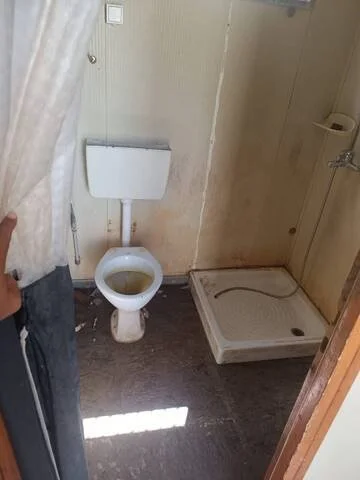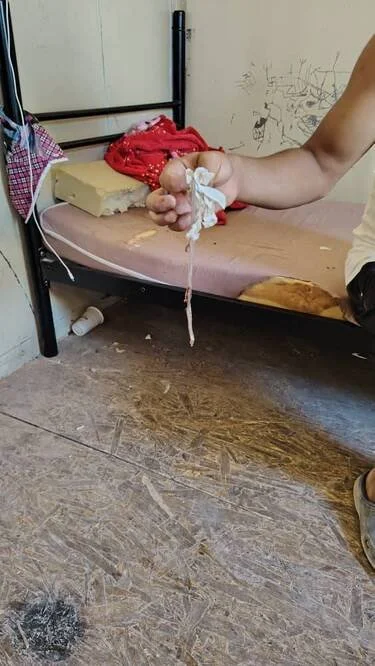Statement
‘Psychological pressure’ in Amygdaleza: undignified detention conditions and violation of asylum rights
31 October 2025
Trigger warning: this post contains images depicting unhygienic living conditions, including images of vermin and visible skin infections. You can find a version of this post without some of these images on Instagram.
Read the Greek translation of the statement here - Διαβάστε την ελληνική μετάφραση της δήλωσης εδώ
Read the Arabic translation of the statement here - اقرأ الترجمة العربية للبيان هنا
Since September 23, the Border Violence Monitoring Network (BVMN) has been contacted by several people detained in Amygdaleza pre-removal detention centre (PRDC), detailing horrific conditions and confusion as to the reasons and length of their detention. These reports corroborate details recently shared by Efsyn, as well as messages received on MIT’s helplines, and add to a growing body of evidence on the poor conditions in the facility. Many of those have been detained there for more than three months, and were previously subject to the suspension of asylum applications. Despite the ban being lifted, people - in particular nationals from so-called ‘safe countries of origin’ - have had their period of detention repeatedly extended. Many have still not been able to apply for asylum. After reiterating their demands daily for months, more than 30 people started a hunger strike this week. Their claims are simple: respect for their rights to apply for asylum and to fair and dignified treatment.
Undignified conditions of detention
Accommodation
All people BVMN spoke with reported being in overcrowded containers. Everyone also reported that mattresses and blankets were provided only to half or fewer of the number of people in one container. Those without reported having to ask the people around them to share to withstand the dropping temperatures and wetter weather, which also caused rain to leak into the containers. These conditions worsened once the suspension came to an end, and internal transfers led to further overcrowding in certain sections, with one person reporting that people were sleeping in the toilets because of the limited space post-transfer. There are reportedly only 4 toilets and 6 or 7 showers per section. One person reported that the toilets have no doors to provide privacy, and the showers no hot water.
Photo shared with BVMN by a person detained in Amygdaleza, representing a mattress on the floor, without bedframe, October 2025.
Photo shared with BVMN by a person detained in Amygdaleza, representing a toilet and a shower with no door to provide privacy, October 2025.
Hygiene
People described dirty conditions inside the containers, and trash being left to “rot” before being cleared away only from the outside. Hygiene products, including a toothbrush, toothpaste and soap, have only been distributed once upon arrival, with requests for additional products routinely ignored. No new clothes have been distributed, with one person reporting that he’s been in the same clothes for 70 days.
Photo shared with BVMN by a person detained in Amygdaleza, representing how dirty the containers detainees have to sleep in are, October 2025.
Infestation
Confirming information shared by Efsyn about insect infestations, one person described their container as “a house of insects”. Another confirmed reports of snakes, and recounted how even the authorities are afraid of dealing with them. Two people also confirmed the presence of mice and “hundreds of rats”, with one person explaining that people were alternating their sleep schedules to chase the rats away from others as they slept.
Photo shared with BVMN by a person detained in Amygdaleza, representing a big rat inside a container, October 2025.
Food
People also shared on the poor - sometimes inedible - quality of the food provided, expressing concern for its limited nutritional value and the fact that it is often not enough for them to feel full. On this, one person concluded by saying “we feel like we’re not in an EU country, we feel like we’re still in Libya.”
Medical care
People have also reported a highly concerning lack of appropriate healthcare within the facility. Requests have to be made repeatedly to consult medical staff including dentists, with people often experiencing severe and urgent medical issues before receiving help. Reports also mentioned highly limited treatment available, with one type of medication being provided for all kinds of ailments, including skin diseases. One person with diabetes explained he has not been able to get insulin since his arrival in Greece in July, but has stopped asking the authorities for it in fear of being detained for longer in retaliation. In addition, people reported facing mental struggles over their undignified conditions as well as the uncertainty concerning their access to legal procedures, but highlighted a clear lack of psychological care in the facility.
Screenshot of a video shared with BVMN by a person detained in Amygdaleza, representing an injury on one detainee’s leg, due to a skin condition, October 2025.
Limited information and access to asylum
As raised by Efsyn, the legal basis for detention of those people after the end of the asylum ban remains unclear. In the course of conversations BVMN had with those who reached out, it emerged that people were highly confused upon arrival and reported receiving different information about applicable procedures. In addition, while some non-governmental actors did visit the facility during their detention, they reportedly only provided (legal) support to other nationalities, such as Yemenis and Sudanese. Once the ban came to an end, they insisted on a complete lack of information provided by the authorities with regard to asylum applications, despite going everyday to the authorities of the centre to request for registration of their request.
Further confusion was caused by the transfer of, first, nationals from Eritrea and Sudan to the Reception and Identification Centre (RIC) in Malakasa to apply for asylum, and subsequently of other nationalities, including Yemenis, reportedly after the end of the ban. This created a strong feeling of unfairness among remaining detainees - many of whom are Egyptian - who insisted on a complete lack of information from the authorities regarding access to an asylum procedure despite commitments that their asylum claims would be examined.
One person reported that an official faked writing down their details, and said they never heard back about their request:
“One time when I came for asylum application, he say okay okay tell me your number and I call you back. When I tell him my number, he act like he sign but he didn’t - he sign on the air, not on the paper. I see him; he didn’t recognise when I see him but I see him sign for the air not the paper. He treat me like a stupid.”
After the end of the ban, the Ministry of Migration and Asylum planned to record up to 50 asylum requests per day. Of all those who reached out to BVMN since 23 September, none have yet been able to register their asylum claims. They have instead repeatedly received documents extending their detention, and expressed a constant state of fear of being deported.
Disturbing reports of mistreatment, racism and violence
Several people also shared disturbing reports of mistreatment, racism and violence (both physical and verbal) with BVMN, reportedly occurring at any given moment. This physical violence is reportedly accompanied by repeated insults: “All the time bad words. [...] I heard that they say “malaka, malaka, malaka, malaka”. All day “malaka”.” Instead of responding to requests for information, access to asylum as well as dignified conditions, officers reportedly tell people:
“go clean yourself in your country; go medical care in your country. We need to ask for our right - take your right in your country. That’s the same answer from the officer from day one - go to your country to have it, not us.”
One person referred to this situation as “psychological pressure” used as a tool by the authorities to push people held in the facility to sign for deportation. They described how it was leading to exhaustion and a sense of hopelessness among the detainees, who at the time of the conversation, were still all refusing to sign:
“there is a lot of people that are disappointed and want to sign for deport because they are tired to ask for asylum but now they are thinking about deport.”
We stand in solidarity with all those who are protesting to access their rights and call the Greek authorities to urgently ensure all have access to fair asylum procedures, procedural guarantees and dignified living conditions in open state facilities while their procedures are pending.






